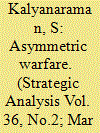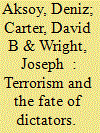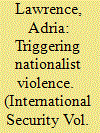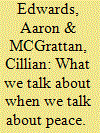| Srl | Item |
| 1 |
ID:
111278


|
|
|
|
|
| Publication |
2012.
|
| Summary/Abstract |
Coined a few years ago, 'asymmetric warfare' is an umbrella term that includes insurgent and terrorist campaigns that Western militaries were forced to contend with in the course of external interventions. Asymmetric wars for Western countries are wars of choice, not wars of necessity.
|
|
|
|
|
|
|
|
|
|
|
|
|
|
|
|
| 2 |
ID:
175587


|
|
|
|
|
| Summary/Abstract |
Why do extremist organizations issue terrorist bluffs? According to previous research, empty threats against civilians are likely to negatively influence assessments of groups’ strength and credibility, thus making it more difficult for extremists to achieve their goals. Despite these potential audience costs, bluffing is a common terrorist tactic. This inquiry assesses data on the bluffing patterns of three organizations—Boko Haram, Jamaat-ul-Ahrar, and the Real Irish Republican Army—and finds that groups suffer few costs for making empty terrorist threats. Furthermore, extremists bluff to advance a variety of strategic goals including outbidding rival factions, spoiling peace settlements, and intimidating civilians.
|
|
|
|
|
|
|
|
|
|
|
|
|
|
|
|
| 3 |
ID:
139919


|
|
|
|
|
| Summary/Abstract |
The authors study the influence of domestic political dissent and violence on incumbent dictators and their regimes. They argue that elite with an interest in preserving the regime hold dictators accountable when there is a significant increase in terrorism. To pinpoint the accountability of dictators to elite who are strongly invested in the current regime, the authors make a novel theoretical distinction between reshuffling coups that change the leader but leave the regime intact and regime-change coups that completely change the set of elites atop the regime. Using a new data set that distinguishes between these two coup types, the authors provide robust evidence that terrorism is a consistent predictor of reshuffling coups, whereas forms of dissent that require broader public participation and support, such as protests and insurgencies, are associated with regime-change coup attempts. This article is the first to show that incumbent dictators are held accountable for terrorist campaigns that occur on their watch.
|
|
|
|
|
|
|
|
|
|
|
|
|
|
|
|
| 4 |
ID:
098661


|
|
|
|
|
| Publication |
2010.
|
| Summary/Abstract |
Nationalist conflict has been one of the most pervasive and intractable types of conflict in the modern era. In some places, nationalist conflict has entailed lengthy wars, terrorist campaigns, and rural insurgency. Yet in many others, nationalist organizations have pursued peaceful strategies, engaging in bargaining, diplomacy, and popular protest. Why do some nationalist movements turn violent, whereas others remain primarily peaceful? Drawing on nationalist struggles against the French colonial empire, the competitive violence theory posits that violence was primarily driven by competition among nationalists. Nationalist violence erupted when colonial states pursued policies to restrict nationalist opposition and repress leading nationalists, creating a leadership vacuum and encouraging new nationalist actors to use violence to vie for influence. The competitive violence theory exemplifies an approach that can explain variation in both the timing and location of violence.
|
|
|
|
|
|
|
|
|
|
|
|
|
|
|
|
| 5 |
ID:
121897


|
|
|
|
|
| Publication |
2013.
|
| Summary/Abstract |
Kieran McEvoy and Peter Shirlow's response to our article is emblematic of the very tendencies towards the creation of problematic conceptualisations of peace that we had set out to critique. 1 Our article sought to problematise the over-confidence of claims that everything was "settled" and that we must thank terrorists and ex-terrorists for their magnanimous gift of having led us out of the very situation they led us into in the first place, as if peace was a privilege and not a right. We characterised the tendency to overinflate the role of paramilitaries in fostering peace as equivalent to the promotion of what we termed "terroristic narratives"-namely, stories that elided notions of "peace" with terrorists' own self-justifications. We suggested that the political effect of this was to defer recognition of the nationalising impulse behind terrorist campaigns in Northern Ireland-an impulse that remains in the post-hoc appraisals by terrorists of their actions. We suggested that the failure to tackle this could be deleterious for the stated objectives of both the British and Irish governments to cultivate a shared society in Northern Ireland.
|
|
|
|
|
|
|
|
|
|
|
|
|
|
|
|